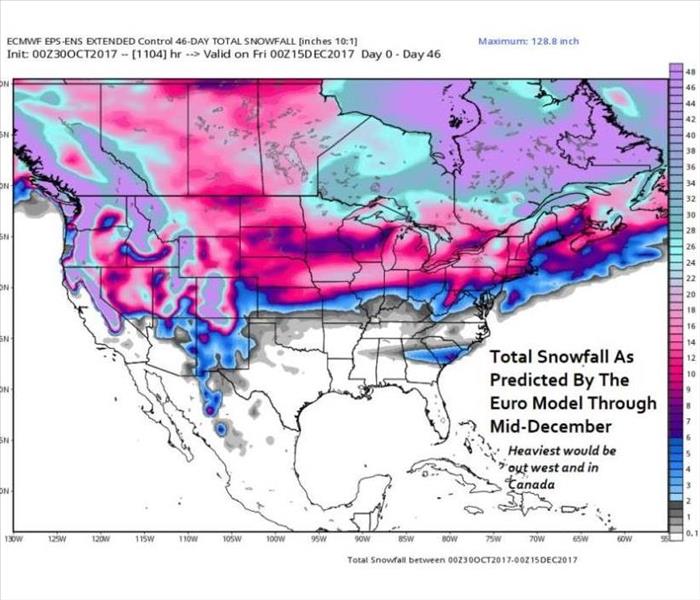Winter Is Coming…maybe!
11/3/2017 (Permalink)
Don’t expect blockbuster snowfall this winter, says David Epstein for Boston.com!
Early predictions for the entire winter are notoriously difficult to compile. These forecasts are also not very reliable, and it’s not prudent to use a single forecast to predict the weather for the next five months.
However, here are some early predictions to get you thinking:
1. We’ll be impacted by La Niña.Perhaps most notably this year, we are looking at a weak or moderate La Niña, which is when the ocean waters off the coast of Peru turn colder than average.
In this pattern, New England often sees average snowfall totals, but, of course, there are always exceptions. During some La Niña years, New England has received higher-than-average snowfall — but just not as frequently as when snowfall is closer to average.
It’s also worth noting that the National Weather Service predicts a warmer-than-average winter across the eastern United States, largely because of La Niña.
2. We’ve had a warmer-than-average autumn so far.Another data point to consider is autumn’s weather. A warm or cold fall is an indication of the atmosphere’s state. What happens from Sept. 1 to Nov. 30 can guide the thinking of what type of winter we’ll experience.
September and October 2017 were very warm — in fact, October in Boston came within one-tenth of a degree of tying the warmest on record — so it’s useful to review snowfall after some of the warmest September-October couplings.
3. November could also be warm.The weather during November is also a good predictor for what will happen from December through March. If a warm November follows a warm October, the odds are high that the winter will be mild.
But if November turns cold after a warm October, then the rest of the winter is often quite snowy and cold.
If you’re rooting for a winter without a lot of snow, you’ll like the European model. It’s forecasting a warmer-than-average November, which would increase the odds of less snow in southern New England.
In addition to the above, forecasters and climatologists are monitoring a slew of other factors, including the snow cover across the Arctic and Canada, the phase of the Arctic Oscillation, the North Atlantic Oscillation, the Pacific/North American pattern, and more. These measurements are based on different pressure setups and, once again, they help to predict the mean storm track as well as how much cold air impacts the weather.
In New England, our winter weather appears to be highly variable with periods of deep cold followed by periods of mild weather. The snow cover may appear and then disappear in a matter of a week or two.
For all of these reasons, I don’t think this winter will be a blockbuster one. Yes, we will get snow and cold — ’tis the season, after all. Stay tuned for additional details and forecasts, which will be more specific and accurate than a long-range forecast is capable of doing.
For the complete article (with pictures!), click here.






 24/7 Emergency Service
24/7 Emergency Service
